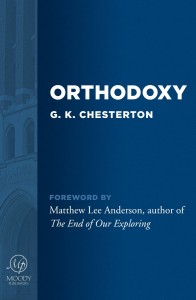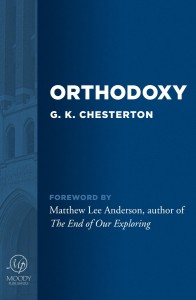Donald Miller recently offered this commendation of Chesterton to all of Christians:
Personalities like Chesterton, C.S. Lewis and Kipling are gone now in the Christian world. Or at least they are unknown. Christian thinking is dominated by Americans who choose simplicity over reason. We like thinkers who pick an enemy and attack them. Lost is the humor, a winsome nature and even a robust intellectualism. The same figures who demand “thought” are hardly thinking at all, and instead attack those who do because they won’t submit to their linear, black-and-white view of life.
Now before I get going, I want to note my appreciation for this point. People like Chesterton and Lewis are gone from the world and those of us who are admirers don't come anywhere near them in stature or quality. They saw things that we can only grasp the outlines of, which is why there is a cottage industry of trying to simply repeat what they said better than us all.
But it strikes me as, well, surprising that Miller is commending Chesterton so highly to us. Especially given that in the same paragraph he chastises those inclined to exhort people toward thoughtfulness for attacking people because they "won't submit to their linear, black-and-white view of life." Such titans are gone indeed, but Miller's own approach isn't going to bring them back.
Before I give my reasons for finding this all a bit amusing, though, I want to make sure my critique avoids Miller's recently-articulated description of how internet critics operate: "Somebody writes a “response” that is filled with vague, passive insults."* Insults aren't quite my thing, but I try to avoid vagueness and passivity at all costs too. So let me be as clear as possible and take an aggressive stand: I have read G.K. Chesterton, I have even written an introduction for a book by G.K. Chesterton, and Donald Miller is no G.K. Chesterton.
Consider the tacit critique of a "black-and-white" view of life. To commend the opposite while lauding G.K. Chesterton so fundamentally misunderstands Chesterton's outlook that the mind boggles. Orthodoxy is a book written entirely for the purposes of describing Christianity's sharp edges, her boundaries, her beautiful distinctions, over and against a host of fuzzy-headed competitors. Chesterton may have approached things with a dazzling rhetorical brilliance, but he knew how an argument worked, as anyone who has slogged through The Everlasting Man would know.
But Chesterton lived and ate dogma, a word he seemed to have been abnormally interested in rehabilitating and that is no more popular these days. After all, he knew the sharp edges mattered: "The spike of dogma fitted exactly into the hole in the world." That's from Orthodoxy. But his most complete statement on the matter came at the end of his book he had the temerity to title Heretics, where he named his contemporaries and proceeded to eviscerate them with his cheerful prose. Chesterton is magical because he kept his sense of humor while using it at the expense of his intellectual foes. He has his fun by attacking those with no interest in "black and white thinking." But that's only an aside: I'll let Chesterton sum up his own point in that section, as only he can: "Man can be defined as an animal that makes dogmas," and "Trees have no dogmas. Turnips are singularly broad-minded."
Now, compare all that with Blue Like Jazz, a book with a subtitle that sums up everything you need to know about it: "Nonreligious Thoughts about Spirituality."
Login to read more
Sign in or create a free account to access Subscriber-only content.
Topics:
